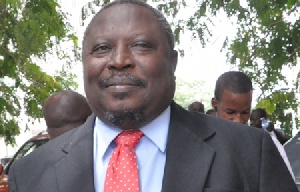 Martin Amidu, former Attorney General
Martin Amidu, former Attorney General
A former Attorney General (AG), Martin A. B. K. Amidu, is daring the Minority National Democratic Congress’ (NDC) Members Parliament (MPs) to provide evidence if they have to the Police to enable them cause the re-arrest of the eight members of the vigilante group, Delta Force, who were discharged by a High Court for lack of evidence.
In the view of Mr. Amidu, the advice that was proffered by the Attorney General on the docket of the Delta Force 8 was apt and proper but for the Minority NDC MPs to take a contrary stance and make capital out of it is lacks merit.
The 8 suspects Abass Caesar, Samuel Yeboah, Ebenezer Opoku, Kofi Fosu, Christian Anokye, Kwame Frempong, Eric Kusi and Abdul Suleman Odudu were freed because the prosecution does not have evidence to prove its case of assault on a public officer and three other charges leveled against them.
But the Minority NDC MPs 1led by Haruna Iddrisu, Wednesday, told a press conference that they found the decision to free the Delta Force 8 for lack of evidence very bizarre when the very evidence to implicate the group was so common on social media and other media platforms.
They, therefore, demanded that the court overturns its ruling and order for the re-arrest of the group and prosecute them.
But Martin Amidu in a post over the issue dared the Minority NDC Caucus to provide evidence they claim are all over social media to the Police to enable them investigate the matter very well and cause the re-arrest of the group and prosecute them.
“What the advice proffered by the Ashanti Regional office of the Attorney General demonstrates is the importance of the presumption of innocence. Six of the eight alleged Delta Force members have stated that they are not members of the NPP and did not take part in the alleged crime. Two of the eight admitted that they are NPP members but they were not part of the group that committed the offences for which they were charged. The Complainant was a police officer who was not even present at the scene of the offence.
The two police witnesses who made written statements could not identify any of the suspects as a participant in the crime. Is it the fault of the suspects that the police could not produce a better docket implicating them? Not at all!”
“But the party of national democracy (the NDC) nonetheless wanted the attorneys to have presumed the suspects guilty and charged them for court without any evidence. This is the very attitude of political interference in the constitutional duties of the Attorney General’s office which I fought against during my tenure as the Attorney General under NDC 3. Professional attorneys in the Attorney General’s Department do not manufacture evidence; they act upon the facts and evidence on the police docket.”
“Re-arresting suspects who have contested their arrest and submitted themselves to the Republic to prove their guilt and against each of whom the Republic lacks evidence to prosecute will be inconsistent with and in contravention of the fundamental rights and freedoms of the citizen and accordingly unconstitutional.
What the NDC should be doing is to furnish the police with the evidence, including the video they have to enable the police to build a better docket for prosecution instead of the unconstitutional instruction to re-arrest citizens who have been discharged by a court of law. The invitation to the President, a former Attorney General, to interfere in criminal prosecutions is capricious and unbecoming of the ideals of a national democratic congress.”
“I am informed that the Attorney General was and is out of the jurisdiction which may explain the hurry to blame the professional attorneys performing their prosecutorial functions in the Ashanti Region. The suspects have only been discharged. Should the Attorney General be of the view that because the suspects are alleged to be NPP members she can find the evidence to prosecute them in spite of the available docket, she has a right to call for the docket and give further directives on them.”
“The minority NDC in parliament is acting politically and unconstitutionally in its complaints on this matter. The judiciary understands the presumption of innocence and the fact that only suspects against whom evidence is available may be prosecuted,” he noted.